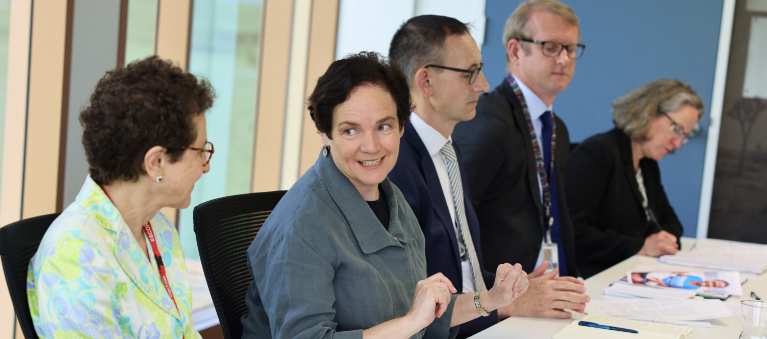Partnerships with Government

ACFID President Susan Pascoe speaks with DFAT Secretary Kathryn Campbell at a meeting to discuss advancing the ACFID-DFAT partnership, building support for the development program, development effectiveness, and ACFID members’ longstanding connections with local communities. Photo: DFAT.
ACFID works with the Australian Government to:
- Influence and inform Australia’s aid and development policy
- Build a policy and regulatory environment that enables the work of its members
- Support collaboration between NGOs and government actors in the development and humanitarian response
Department of Foreign Affairs and Trade
ACFID and the Department of Foreign Affairs and Trade (DFAT) have a partnership agreement that recognises the ongoing, long-standing cooperation between the two organisations to promote a robust and effective Australian international development sector.
The partnership supports NGO effectiveness and innovation through the application of the ACFID Code of Conduct and other learning and development initiatives. The partnership also supports policy dialogue, consultation and knowledge-sharing between DFAT and Australian NGOs in Canberra and at overseas posts.
ACFID acknowledges the important support of DFAT. Government funding supplements the core funding provided by ACFID member fees.
Download DFAT and ACFID's 2019-2024 Partnership MOU here
Any advocacy undertaken by ACFID is fully funded by member fees.
Australian Civil Military Centre
ACFID works in partnership with the Australian Civil Military Centre, with a Civil Society Advisor seconded to the Centre. The role of the advisor is to ensure civil society perspectives are considered in the development of Australia’s civil-military capabilities to prevent, prepare for, and respond to conflicts and disasters overseas.
The ACMC also provides funding support for the Asia-Pacific Development, Diplomacy & Defence Dialogue’s (AP4D) program, ‘Shaping a shared future — deepening Australia’s influence in Southeast Asia and the Pacific’.
Committee for Development Cooperation
Established in 1975, the Committee for Development Cooperation (CDC) is a joint DFAT/NGO advisory body that provides advice and guidance on the DFAT accreditation process for Australian NGOs, the Australian NGO Cooperation Program (ANCP), and other funding streams involving Australian NGOs.
The CDC is made up of eight members – four from the Australian NGO sector and four from DFAT. DFAT and ACFID jointly provide Secretariat support to the CDC.
Of the four NGO members, two members are elected by the accredited NGO sector, and two members are appointed by ACFID’s Board. NGO members serve two years.
To raise an issue for NGO representatives to take to the CDC, contact Emily Moreton at ACFID at [email protected]








